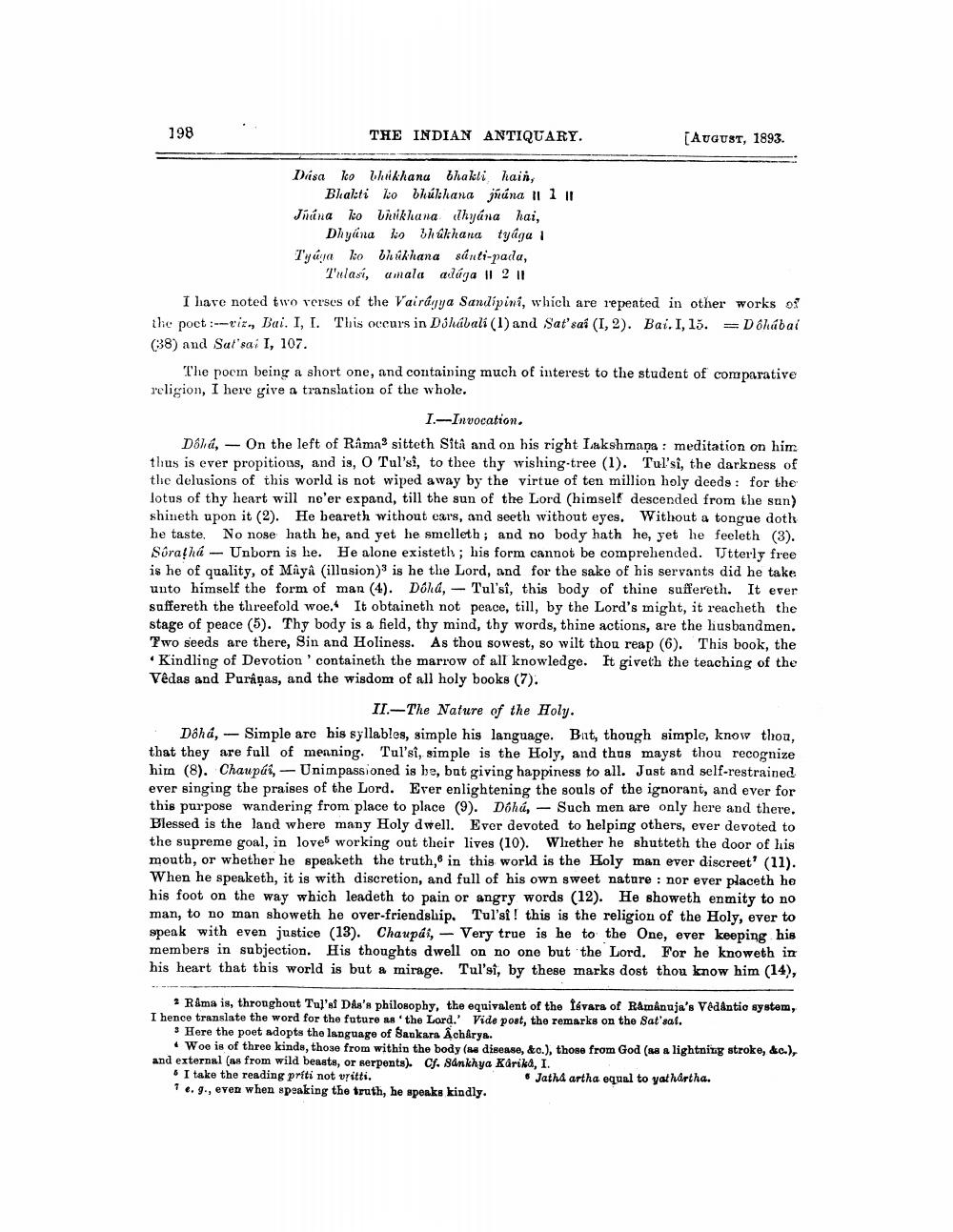________________
198
THE INDIAN ANTIQUARY.
[AUGUST, 1893.
Disa ko whilkhana thakli hain,
Bhakti Lo bhukhana jiúna 11 11 Jhina ko lnvikhana hyána hai,
Dhyána lo Shukhana tyága 1 Tyúja ko bhukhana súnti-pada,
Tulasi, amala ailága 11 2 11 I have noted two verses of the Vairágya Sandipini, which are repeated in other works of the poct :-rit., Bai. I, I. This occurs in Dhabali (1) and Sat'sai (1, 2). Bai. I, 15. =D6hábai (38) and Sat'sai I, 107.
The poem being a short one, and containing much of interest to the student of comparative religion, I here give a translation of the whole.
I.-Invocation. Dlá, - On the left of Râmn sitteth Sità and on his right Lakshmana: meditation on him. thus is ever propitious, and is, O Tulsi, to thee thy wishing-tree (1). Tulsi, the darkness of thie delusions of this world is not wiped away by the virtue of ten million holy deeds: for the lotus of thy heart will no'er expand, till the sun of the Lord (himself descended from the sun) shineth upon it (2). He beareth without ears, and seeth without eyes. Without a tongue doth he taste. No nose hath he, and yet he smelleth; and no body hath he, yet he feeleth (3). Söratha - Unborn is he. He alone existeth; his form cannot be comprehended. Utterly free is he of quality, of Maya (illusion) is he the Lord, and for the sake of his servants did he take unto himself the form of man (4). Dóhd, - Tul'sî, this body of thine suffereth. It ever suffereth the threefold woe. It obtaineth not peace, till, by the Lord's might, it reacheth the stage of peace (5). Thy body is a field, thy mind, thy words, thine actions, are the husband men. Two seeds are there, Sin and Holiness. As thou sowest, so wilt thou reap (6). This book, the • Kindling of Devotion containeth the marrow of all knowledge. It giveth the teaching of the Vedas and Puriņas, and the wisdom of all holy books (7).
II.-The Nature of the Holy. Dohá, - Simple are his syllables, simple his language. But, though simple, know thou, that they are full of menning. Tulsi, simple is the Holy, and thus mayst thou recognize hirn (8). Chaupút, -Unimpassioned is be, but giving happiness to all. Just and self-restrained ever singing the praises of the Lord. Erer enlightening the souls of the ignorant, and ever for this purpose wandering from place to place (9). Dóhú, – Such men are only here and there. Blessed is the land where many Holy dwell. Ever devoted to helping others, ever devoted to the supreme goal, in loves working out their lives (10). Wlrether he shutteth the door of his mouth, or whether he speaketh the truth, in this world is the Holy man ever discreet' (11). When he speaketh, it is with discretion, and full of his own sweet nature : nor ever placeth he his foot on the way which leadeth to pain or angry words (12). He showeth enmity to no man, to no man showeth he over-friendship. Tul'si! this is the religion of the Holy, ever to speak with even justice (13). Chaupái, - Very true is he to the One, ever keeping his members in subjection. His thoughts dwell on no one but the Lord. For he knoweth in his heart that this world is but a mirage. Tulisi, by these marks dost thou know him (14),
- Rama is, throughout Tulle DAs's philosophy, the equivalent of the føvara of Ramanuja's VedAntio system, I hence translate the word for the future as the Lord.' Vide post, the remarks on the Sat'sal.
3 Here the poet adopts the language of Bankara Acharya.
+ Woo is of three kinds, those from within the body (ne disease, &c.), those from God (as a lightning stroko, &c.), and external (as from wild beasts, or serpents). Cf. Sankhya Karika, I. . I take the reading priti not vritti.
Jatha artha equal to yathartha. 16. 9., even when speaking the truth, he speaks kindly.




